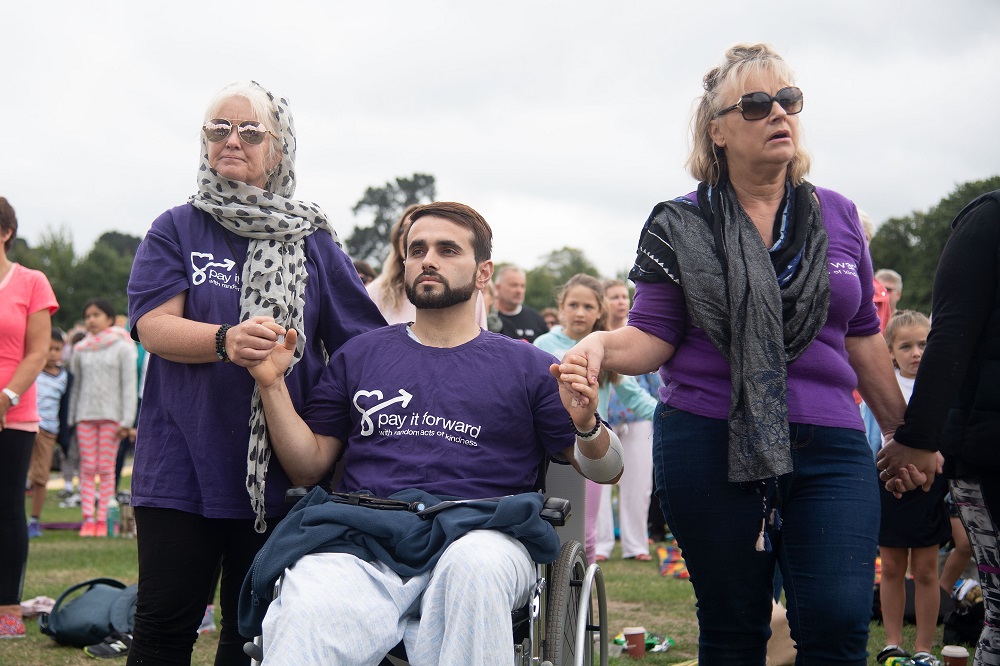Christchurch shootings fuel politics of race in NZ, Australia
By KARL WILSON | China Daily Global | Updated: 2019-03-25 11:24

Debate ongoing in past week over whether racism and hate speech have become normalized
Many in New Zealand and Australia are trying to come to terms with the spread of white supremacy, following the shooting of 50 people in Christchurch mosques earlier this month.
New Zealand Prime Minister Jacinda Ardern said that while it was an Australian citizen who committed the atrocity, "that is not to say that we do not have an ideology in New Zealand that would be an affront to the majority of New Zealanders".
Ardern said the problem of white nationalism is not unique to any one nation and called on leaders around the world "to weed it out where it exists and make sure that we never create an environment where it can flourish".
"If we want to make sure globally that we are a safe and tolerant and inclusive world, we cannot think about this in terms of boundaries," she told BBC News recently.
On March 15, a gunman walked into two mosques in the New Zealand city and opened fire, livestreaming his attack at one mosque on social media. He used semi-automatic assault weapons bought legally in a country that many consider to have lax gun laws.
Brenton Harrison Tarrant, 28, who was born in Australia but lived in New Zealand, has been charged with murder in the attacks, which left 50 people dead and dozens injured.
New Zealand's Office of Film and Literature Classification has issued a statement officially classifying the shooter's online manifesto as "objectionable" under the country's law.
"There is an important distinction to be made between 'hate speech', which may be rejected by many right-thinking people but which is legal to express, and this type of publication, which is deliberately constructed to inspire further murder and terrorism," New Zealand's Chief Censor David Shanks said on Saturday.
In Australia, the debate over the past week has been whether racism and hate speech have become normalized. Within hours of the killings, right-wing senator Fraser Anning issued a statement in which he blamed the attack on Muslim migration.
Anning said: "The real cause of bloodshed on New Zealand streets today (March 15) is the immigration program that allowed Muslim fanatics to migrate to New Zealand in the first place."
Ardern in New Zealand has rejected any argument that her country's policy of welcoming refugees and immigrants was to blame for the violence.
Yet Anning and others like him are seen to have added fuel to hate speech, especially when it comes to Muslims in Australia.
The politicians are not alone. Right-wing commentators have helped fan the flames of hate. The senator's comments were an extreme example of hate speech but not entirely alien to Australian political debate, according to Bilal Rauf from the Australian National Imams Council.
He said the rhetoric targeting migrants and minority groups has become commonplace and that has in turn emboldened political violence.
"In many ways, for the people who have borne the brunt of these words, the attack in Christchurch was not a surprise," he told the BBC.
"The situation has gotten so toxic, so fueled by divisive things, that the politicians and media commentators say that it (an attack against Muslims) was only a matter of time."
Andre Oboler of La Trobe University in Melbourne said right-wing extremism and neo-Nazis have been around for a long time.
"What is new is the rise of the alt-right (alternative right)," Oboler, who also heads the Online Hate Prevention Institute, an Australian charitable organization, told China Daily.
These "extreme nationalists" who are Islamophobic use the internet to get publicity, Oboler said.
"We have the laws," he said. "These people need to be tracked down and prosecuted … it's up to the police and government now."
Paul Buchanan, a former United States counterintelligence specialist who now lives in New Zealand, said the internet "gives these people a global reach".
"It empowers the weak and lonely who are looking for someone to blame for their lives," he said.
Australia's former race discrimination commissioner, Tim Soutphommasane, said that hate speech comes from "prejudice and stereotypes" and is "fueled by fear and anger".
"Unfortunately, we have seen a rise of race politics in Australia, with racism in debate being aired more openly by some politicians and amplified by sections of the media," he said.
"When political debates permit people to believe they can vent hostility at groups, extremist groups can be encouraged to ramp up their rhetoric and activity."
Now a professor of sociology and political theory at the University of Sydney, and author of the book On Hate published in February, Soutphommasane said: "For most of the past two decades, anti-Muslim and anti-Arab sentiments have been rife in public debates."
The Australian Parliament is regularly the scene of brazen far-right political stunts, he said.
"White supremacist slogans and language are used with impunity. Last year, when One Nation leader Pauline Hanson moved a motion stating that 'it is OK to be white', she was backed by government senators (who later recanted, claiming administrative error)."
Various mainstream outlets have also been accused of providing uncritical and sympathetic platforms to neo-Nazi activists and figures associated with the alt-right. Australia's most prominent right-wing commentator, Andrew Bolt, has written of "a tidal wave of immigration".
Soutphommasane said the politics of hate need to be taken more seriously.
"Not every instance of hateful speech will result in violence, but racist violence will always begin with racist ideas," he said.
























